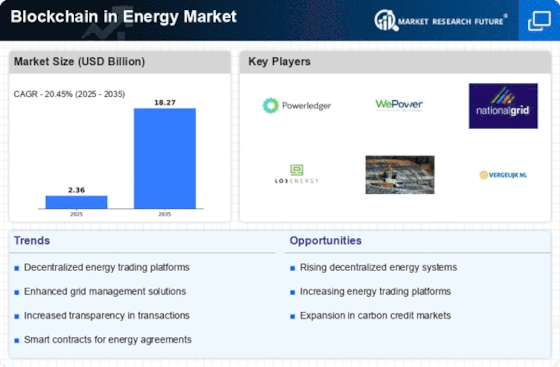Top Industry Leaders in the Blockchain in Energy Market
Competitive Landscape of Blockchain in Energy Market
The energy sector, long burdened by centralized structures and operational inefficiencies, is witnessing a transformative surge with the advent of blockchain technology. This distributed ledger offers promising solutions for enhanced transparency, data security, and streamlined processes, attracting numerous players to carve their niche in this rapidly evolving market.
Key Players:
- Power ledger private limited
- We power UAB
- LO3 Energy Inc Grid
- BTL group limited
- The sun exchange limited
- Conjoule GmbH
- Enosis foundation
- Electron
- Infosys limited
- SAP SE
- Oracle corporation
- Accenture PLC
- We Power UAB
- IBM corporation
- Micro-soft corporation
- Deloitte Touche Tohmatsu limited
Market Share Analysis:
-
Type of Blockchain: Public blockchains like Ethereum cater to peer-to-peer energy trading and decentralized marketplaces, while private blockchains find favor with larger utilities and consortiums focused on internal optimization and data security.
-
Application Focus: Payments and microgrid management currently hold the dominant market share, while applications like renewable energy certification and carbon credit tracking are witnessing substantial growth.
-
Geographic Distribution: North America and Europe lead the way in terms of market size and innovation, while Asia-Pacific region exhibits significant potential due to rapidly evolving energy landscapes and supportive government policies.
Strategies Adopted:
-
Strategic Partnerships: Companies are actively collaborating across vertical boundaries, forming alliances with energy providers, technology vendors, and regulatory bodies to access wider markets and build robust solutions.
-
Platform & Ecosystem Development: Creating user-friendly platforms and fostering open-source blockchain ecosystems with standardized protocols is crucial for driving adoption and attracting diverse stakeholders.
-
Regulatory Advocacy: Engaging with policymakers and advocating for clear regulations that facilitate blockchain adoption without stifling innovation is essential for long-term market stability.
Emerging Companies:
-
Autobahn: Developing blockchain-based charging networks for electric vehicles, enabling secure and transparent transactions along with automated billing and settlement.
-
SunContract: Pioneering peer-to-peer solar energy trading platforms empowering individuals and communities to manage and monetize their renewable energy resources.
-
GridBeyond: Utilizing blockchain for demand response optimization, allowing energy consumers to actively participate in the grid and receive financial rewards for adjusting their energy use.
Investment Trends:
-
Venture Capital: VC firms are actively pouring investments into promising blockchain startups in the energy sector, recognizing the immense potential for disruption and value creation.
-
Utility & Energy Companies: Major energy players are increasingly investing in pilot projects and internal blockchain initiatives to explore potential applications for improving efficiency and customer engagement.
-
Government Funding: Public initiatives and grants are supporting research and development in blockchain for energy, particularly focused on renewable energy integration and grid modernization.
Latest Industry News:
Jan 27, 2024: Energy giants Shell and EnBW have joined forces to launch a blockchain-based platform called "Greenchain" for peer-to-peer trading of renewable energy certificates (RECs). The platform, based on Ethereum, aims to increase transparency and efficiency in the REC market, boosting renewable energy investments.
Jan 25, 2024: The California Public Utilities Commission has approved a pilot project utilizing blockchain technology to manage a microgrid in a low-income community. The project, led by LO3 Energy, aims to demonstrate the feasibility of blockchain for optimizing energy distribution and empowering local communities.
Jan 23, 2024: IBM and WElink Energy have signed a deal to implement a blockchain solution for tracking and verifying the power generation of a wind farm in India. The project aims to increase transparency and trust in the renewable energy sector by providing tamper-proof data on energy production.
Jan 18, 2024: The European Commission has published draft guidelines on the use of blockchain for energy applications, aiming to provide clarity and encourage responsible development in the industry. The guidelines cover topics like data privacy, security, and interoperability, fostering a unified approach across the EU member states.










